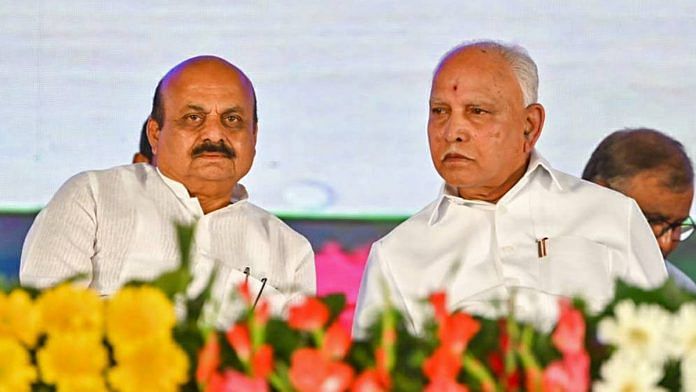Bengaluru: The ruling Bharatiya Janata Party (BJP) has continued its patronage of the dominant Lingayats and Vokkaligas in Karnataka by allocating over 100 seats to members of the two communities whose support it is desperately seeking in the assembly elections.
Of the total 224 seats in the assembly, 60 have been allocated to Lingayats and 43 to Vokkaligas.
After several rounds of deliberations, the BJP released the names of 212 candidates and discussions are underway for the remaining 12 seats, party leaders told The Print.
Although in the reserved category, 36 seats are for Scheduled Castes (SC) and 16 for Scheduled Tribes (ST), the BJP has allocated one seat each from the general category to SC and ST candidates, thereby taking the total to 37 and 17, respectively.
“The SC-Right (Holeya and related communities) have secured around 8 seats and SC-Left (Madiga and related communities) have got around 9. Wherever there is a higher population of SC-Right, where they have the ability to manage election expenses and have a higher winnability factor, we have given them seats. The same principle is followed for SC-Left too,” BJP SC Morcha state president Chalavadi Narayanaswamy told ThePrint.
Apart from Lingayats, there are 32 candidates from the OBC (other backward classes) communities, 10 Brahmins, 2 Rajputs, 2 each from Maratha, Rajput and Jain communities and one from the Kodava community.
Although the caste groupings of at least 10 candidates remain unclear, this analysis represents a majority of those whose caste identities have been confirmed by the BJP.
More importantly, the BJP appears to have focused on giving more representation to the ‘touchable’ category – Banjaras and Bhovi community– in the SC list by allocating 15 seats to them.
The Banjaras and the Bhovis had protested and pelted stones at former chief minister B.S.Yediyurappa’s office in Shikaripura, after their reservation was capped at 4 per cent in the internal reservation announced by Chief Minister Basavaraj Bommai last month.
Bommai had announced internal reservation for the SC community with the Right getting 5.5 per cent, Left 6 per cent, ‘touchables’ 4 per cent and others 1 per cent.
Political watchers say that there are around 89 communities that come under this ‘others’ category and have been denied adequate representation as the larger communities, which are forward economically, politically and educationally, take away all the benefits meant for SCs.
Also Read: After SDPI says it had ‘understanding’ with Congress in Karnataka, BJP goes on offensive
Caste and Karnataka
Of the 23 chief ministers who have assumed the top chair since 1956 (post the formation of Karnataka), a majority have been Lingayats, followed closely by Vokkaligas as the Congress, the BJP and the Janata Dal (Secular) are known not to stray too far away from the dominant caste politics in the state.
The BJP has had four chief ministers, serving truncated terms during the total nine years they have been in power in Karnataka and of this, only D.V.Sadananda Gowda is a Vokkaliga. Yediyurappa, Jagadish Shettar and Bommai are all Lingayats, though not from the same sub-sect of the community.
In the history of Karnataka, since 1956, the state has had two CMs from the Brahmin community, three from backward communities like Rajput, Ediga, Kurba and Arasu, other than Vokkaligas and Lingayats, according to government data that has been corroborated with experts.
Karnataka has not had any chief minister from communities classified as SC or ST.
Not to say that members, especially from the dominant communities within these groups, have not been in positions of power. Congress president Mallikarjuna Kharge has been the Karnataka home minister, and his name is doing the rounds as the ‘next CM’ if the party manages to secure a majority on its own in the election.
G. Parameshwara of the Congress and Govind Karjol of the BJP, both from SC communities, have served as deputy chief ministers.
Experts say that members of the Banjara and Bhovi community are among the biggest beneficiaries within the SC community and cite this as the reason for the protests against the internal reservation.
“What is the reservation cap on the existing MLAs? I am not sure about the entire state, but in Bengaluru the entire set of MLAs are Bhovi and they will not give up this benefit since all the communities who stand to lose more as a result of internal reservation are the ones protesting,” a Bengaluru-based political analyst said said.
(Edited by Geethalakshmi Ramanathan)
Also Read: Days after crashing ‘ladies’ night’, Bajrang Dal to demand bar on ‘fashion shows’ in Shivamogga



